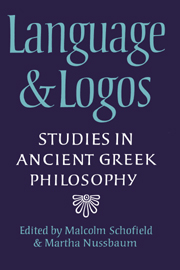Book contents
- Frontmatter
- Contents
- Preface
- Introduction
- 1 Heraclitus' conceptions of flux, fire and material persistence
- 2 Epistemology and meaning in Heraclitus
- 3 The dénouement of the Cratylus
- 4 Cratylus' theory of names and its refutation
- 5 Knowledge and language: the Theaetetus and the Cratylus
- 6 Falsehood and not-being in Plato's Sophist
- 7 Forms and dialectic in the second half of the Parmenides
- 8 Aristotle and the more accurate arguments
- 9 Aristotle on the principles of change in Physics I
- 10 Aristotle on natural teleology
- 11 Accidental unities
- 12 Aristotle's concept of signification
- 13 Saving Aristotle's appearances
- 14 Myths about non-propositional thought
- 15 Gods and heaps
- Bibliography of the publications of G. E. L. Owen
- Index locorum
- Index of names
15 - Gods and heaps
Published online by Cambridge University Press: 09 October 2009
- Frontmatter
- Contents
- Preface
- Introduction
- 1 Heraclitus' conceptions of flux, fire and material persistence
- 2 Epistemology and meaning in Heraclitus
- 3 The dénouement of the Cratylus
- 4 Cratylus' theory of names and its refutation
- 5 Knowledge and language: the Theaetetus and the Cratylus
- 6 Falsehood and not-being in Plato's Sophist
- 7 Forms and dialectic in the second half of the Parmenides
- 8 Aristotle and the more accurate arguments
- 9 Aristotle on the principles of change in Physics I
- 10 Aristotle on natural teleology
- 11 Accidental unities
- 12 Aristotle's concept of signification
- 13 Saving Aristotle's appearances
- 14 Myths about non-propositional thought
- 15 Gods and heaps
- Bibliography of the publications of G. E. L. Owen
- Index locorum
- Index of names
Summary
The ancients were already well aware that the sorites is not just about heaps. It brings into question the very existence of the gods, or at least the rationality of religious belief. If modern philosophers of language (who in recent years have been much preoccupied with the sorites paradox) seldom know this, a magisterial paper by Jonathan Barnes has now made clear the range and richness of the ancient material on the subject. Some of this material looks strange by modern lights. All the more reason, therefore, why enthusiasts for the sorites should take an interest in its history.
The history begins, as everybody knows, with a memorable example fashioned by the past master of paradox, Eubulides of Miletus (4th cent. b.c.), known also for his purveying of the Liar, the Bald Man, the Nobody, and other logical delights (D.L. 11 108).
I say: tell me, do you think that a single grain of wheat is a heap? Thereupon you say: No. Then I say: What do you say about 2 grains? For it is my purpose to ask you questions in succession, and if you do not admit that 2 grains are a heap then I shall ask you about 3 grains. Then I shall proceed to interrogate you further with respect to 4 grains, then 5 and 6 and 7 and 8, and you will assuredly say that none of these makes a heap.
(Galen, On Medical Experience XVII 1, p. 115 Walzer)- Type
- Chapter
- Information
- Language and LogosStudies in Ancient Greek Philosophy Presented to G. E. L. Owen, pp. 315 - 338Publisher: Cambridge University PressPrint publication year: 1982
- 22
- Cited by



